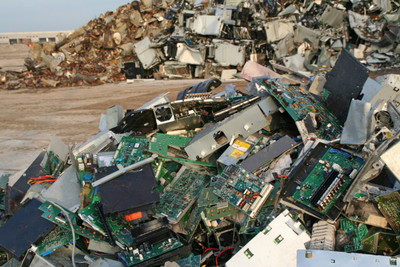How E-cyclers Are Saving the World
May 10th 2021
Four years ago, global e-waste topped 44.7 million metric tons. The ever-rising growth of electronic waste entails countless environmental hazards, both directly and indirectly contributing to air, water, and land pollution as well. The toxic chemicals and components present in electronic devices, as well as the environmental cost of mining and manufacturing new products, have exacted a hefty toll on the global ecosystem since the advent of the digital age. Recently, an increasing number of companies have begun to offer services in the safe recycling of unwanted hardware, as a result becoming known as E-cyclers. Through recycling retired hardware, salvaging their parts and reusing them, E-cyclers have initiated a global practice that will ultimately save the world.
Why is E-waste Dangerous?
Electronic devices contain materials and components that can and do pollute their surroundings. Elements such as lead, mercury, and cadmium are known to cause respiratory and neurological illness, and when deposited in landfills, impart these harmful effects into the landscape. Electronic devices contain not only large amounts, but also feature synthetic chemicals such as dioxins and their subsect, polychlorinated biphenyls (PCBs). Dioxins have been shown to damage both the reproductive and immune systems, while PCBs, an epidermal irritant, can also cause liver damage. These harmful effects, when e-waste is improperly discarded, can leak into the environment and accumulate in the body over time without any immediate symptoms.
E-cyclers recover these materials from old devices, keeping them away from landfills and from potentially polluting water, air, and land. These elements, despite their potential for harm, are nonetheless essential to the production of new devices. Recycling the hardware and reusing the materials that comprise them prevents these hazards from ever reaching the environment.
What are the Valuable Parts of a Computer?
In addition to hazardous materials, electronic devices also contain a host of precious metals. Gold, silver, and palladium are fundamental components in the creation of hardware. Manufacturers use gold as an electroplated coating on connectors, while silver is a necessary part of circuit boards, providing electrical pathways for the flow of energy. Palladium functions within chip capacitors to store energy. Improperly disposing of old hardware could mean throwing out metals that are both rare and high-value.
Companies providing e-cycling services recover these metals from defunct hardware for reuse in the production of new devices. Keeping precious metals in the circulation of manufacture prevents them from being lost amongst the large heaps of debris that make up landfills.
Furthermore, by circulating both precious metals and hazardous elements, E-cyclers reduce the air, water, and land pollution that results from the production of brand new devices. Greenhouse gas emissions rise with every new product, and the environmental toll of mining for raw materials leaves many ecosystems irreparably damaged. Recycling and reuse also lowers energy requirements, further contributing to the sustainability of the industry.
Where does E-waste Go?
An overwhelming portion of electronic waste ships to third world countries. Estimates show that up to 90% of e-waste is illegally dumped or traded into underdeveloped countries, which lack the infrastructure and capabilities to properly treat the hazardous waste. Oftentimes, plastics are burned away from the device to uncover the precious metals within, which generates toxic fumes that further pollute the air. Additionally, the inability to properly dispose of waste results in close-proximity pollution. When these environmental hazards are exposed to the ecosystem, they contaminate the nearby groundwater, topsoil, and even livestock, more closely threatening human health.
Safe recycling practices prevent these risks from ever hazarding less privileged countries. Certified E-Cyclers repurpose components from old hardware for new devices, totally eliminating the risk of international dumping. E-cyclers break down old computers into their base components before they can ever be shipped overseas and illegally deposited.
Moreover, the rise of E-cyclers has also seen a rise in job growth. As issues pertaining to electronic waste grow, so do the specific skills and labor required for safe ecological practices. Countless minds have been employed in service of creative solutions to this growing threat, and countless more will find work as the problems become more complex.
Why Should I Recycle My Old Computer?
Primarily, because in most US states it’s becoming illegal to throw an old computer away along with general trash. Indiana, New Jersey, New York, Massachusetts, both North and South Carolina, and most notably California have imposed bans prohibiting the disposal of hardware with everyday trash. New legislation concerning e-waste passes constantly in every state, and acting against the law could result in sizable fines. However, E-cyclers are continually making recycling an easier and more viable option. Companies exist in almost every state that offer recycling services, and many big-name tech firms even offer trade-in value for the return of an unwanted device.
Additionally, donation presents a mode of disposal still more sustainable than binning electronics. Many centers, such as senior organizations and recreational facilities, are eager for old devices they can then give to underprivileged families and even under-financed schools. Some municipalities even offer collections days in order to bring old devices directly to these organizations, eliminating the need to search them out.
Certified E-cyclers are also the only organizations that can guarantee the secure erasure of data. Data Destruction is one of the most crucial prerequisites to hardware recycling, and attempting the process on one’s own leaves the risk for data compromise too high to be ignored.
Electronic waste poses one of the greatest rising threats to the environment. Careless disposal can result in countless illnesses and damage sensitive global ecosystems. E-cyclers completely erase the detrimental effects of e-waste by recycling the hazardous parts back into production, and as a result are unequivocally saving the world.

